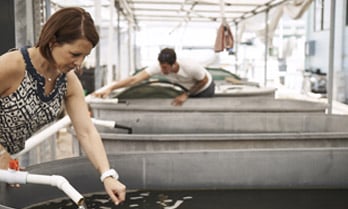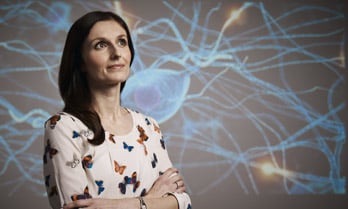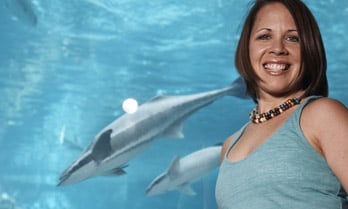2017 Fellow - Stephanie Simonds
11 January 2018
After the whirlwind of being awarded the For Women in Science Fellowship, we asked our 2017 Fellows a bit about their research and what it meant to be awarded the Fellowship.
Discovering the link between CVD and obesity

Stephanie is a physiologist, discovering the link between cardiovascular disease (CVD) and obesity. CVD is the leading cause of death both in Australia and globally, and approximately 70% of hypertension in both males and females is attributed to excess body weight.
Stephanie has not only discovered the link between CVD and obesity, she has identified a unique protection for females suffering from obesity that could provide an exciting future for therapeutic development for CVD.
You have discovered a link between fat derived hormone, leptin and oestrogen and it’s protective mechanism for CVD in females. What could this mean for future treatments or therapeutics for CVD?
CVD are the #1 cause of death in both males and females, not only in Australia but globally, and the accumulation of body fat, significantly increases the risk of CVD development.
My research has shown that there is a link between increased body weight and a hormone released by our fat cells, and this causes an increase in CVD. This hormone travels through our body and acts in the brain to increase blood pressure (BP) and heart rate (HR).
By focusing my research on the development of CVDs in females, we have discovered that pre-menopausally obese females are protected from the development of CVD. However, this protection in lost post-menopause.
I have recently linked this protection to oestrogen. Pre-menopausally, oestrogen acts on the brain and inhibits the fat derived hormone from inducing CVD. However, as females stop producing oestrogen, BP and HR increase, and hence we have lost the protection of CVD in females.
With the knowledge and understanding from my research, I aim to understand how and where oestrogen acts in the brain, and potentially be able to identify targets within the brain to stop the development of CVD, in obesity.
Ultimately, I would love to develop a drug or therapy to help reduce the CVD burden in obese patients in both men and women, which is really exciting!
You are an early career researcher, this is just the start of your scientific career and already you are discovering some fascinating and important answers for CVD and obesity. What does winning this Fellowship mean to you?
The opportunities this fellowship has given has been extremely rewarding.
I am at a really critical point in my career, and this fellowship has given me the confidence to be bold and take risks which I believe will lead to big scientific breakthroughs.
There are so many different aspects of being a successful scientist, you have to be innovative, and you have to answer critical questions important to society. This takes commitment and confidence to conduct the best research you can.
The fellowship will enhance my productivity and research outcomes by supporting me in a laboratory, but more importantly it has encouraged me to continue to progress as a leader in science.



